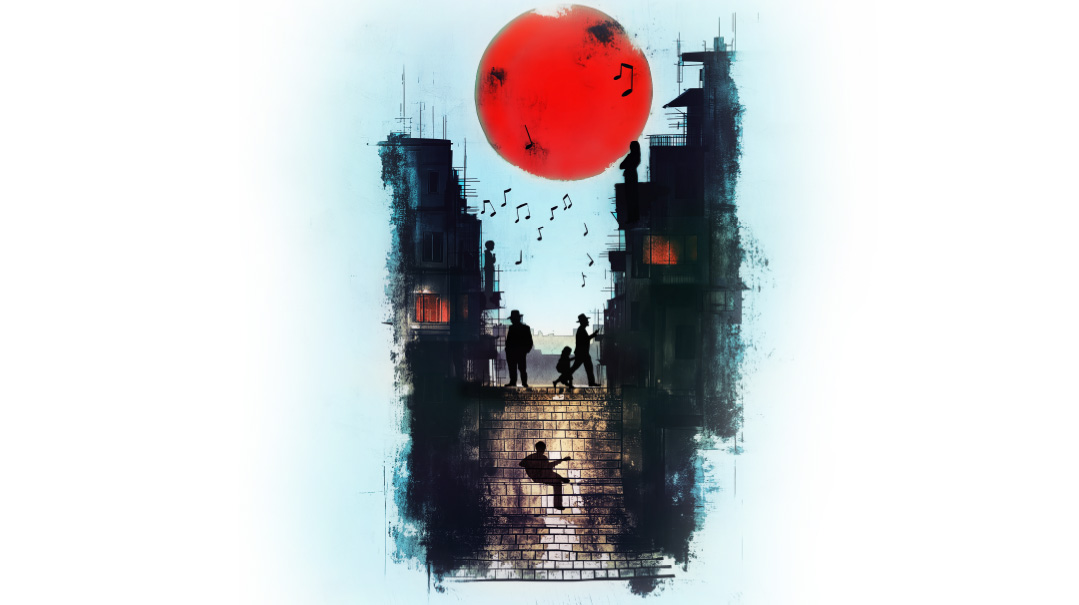Face the Music: Chapter 11

Perri hadn’t been wrong; Shloimy was struggling in shiur. And his maggid shiur clearly didn’t have much compassion for him

Chaim stepped out of the beis medrash and took out his phone. Then he put it back into his pocket. There was a truck unloading drinks at the nearby makolet; it was probably too noisy to have a good conversation with Shloimy’s maggid shiur. Maybe in an hour or two, things would be quieter.
Then he remembered Perri’s narrowed eyes this morning when he’d left the house. “So you’ll call him today, right?” she had said.
“It’s on my list,” he promised.
He didn’t really have a list — they both knew that. But he also knew he couldn’t go back home without checking off this task. And bein hasedorim was his only window to do it. He sighed and walked up the block, away from the truck’s dull rumble and the workers’ barked instructions, and searched his contacts. Schlesinger, Rav. That was it.
“Kein, yes,” came the abrupt greeting.
“Shalom Rav Schlesinger, this is Chaim Weiss, the abba of Shloimy Weiss, from shiur beis.”
“Ah. It’s good you called.”
That didn’t sound promising. Chaim swallowed hard. “So what’s happening with Shloimy? How’s his learning?”
All the years, the answers had always been the same. Shloimy had a good head, he was a fine student, he learned well. Never, except for Rebbi Yudelevitz in fifth grade, had a rebbi offered any more feedback — just platitudes, with no particular excitement over Shloimy’s talent or ability or personality or contribution to the class. Probably because there was nothing to be excited about, Chaim presumed. Shloimy was one of those dependably uninspiring and uninspired boys who did what he was supposed to do but never caught anyone’s attention. Pretty much like Chaim had been.
“So, Rav Weiss wants to know, how is his son learning. Good question.” Rav Schlesinger paused. “It’s hard for him, what can I tell you. We move quickly in shiur beis, they’re big boys now. No more babying, no more coddling.”
“I hear.”
“And your son — he’s having a hard time. He’s not holding. His last test was bad. Even during shiur, he’s not following. He sits there with his eyes open but he’s someplace else, we can all see that.”
“Ah.” Chaim sank down onto a bench and took a deep breath.
“I was actually thinking that we should let you know about this. It’s good you called.”
“I… I hear. So what should we be doing?”
“What should we be doing, Rav Weiss is asking. We need to tell him, Shloimele hayakar, this isn’t shiur aleph anymore, this isn’t kitah gan. Now we’re learning, we’re working, we’re chazering, we’re shteiging. Boys who want to play or dream during shiur, there are other yeshivos for them. Bais Nachum is for boys who want to work. You hear me, Rav Weiss? He needs to know that this is serious.”
Chaim gulped. “B’seder. I’ll speak to him.”
“Yofi, I’m sure his father, he’ll listen to,” Rav Schlesinger trumpeted. “Let me tell you a little vort, Rav Weiss. Reishis chochmah, yiras Hashem. You want to became a chacham, then a little fear is a good thing, eh? Sometimes these American parents, they’re too soft. They tell their bochur’l, whatever you do, it’s all good, we love you. You do learn, you don’t learn, you daven, you don’t daven, we love you. Ei luhv yoo,” he added in English, then laughed at his own wit. “Nu, Rav Weiss, love is nice. Fear, you need that too.”
“M’stama,” Chaim agreed.
“Good. So we’re looking forward to seeing Shloimy shteig very soon. Lots of hatzlachah. Kol tuv.”
Chaim put the phone back into his pocket and watched the workers down the block maneuver another pallet of soda off the truck and onto the sidewalk. So Perri hadn’t been wrong; Shloimy was struggling in shiur. And his maggid shiur clearly didn’t have much compassion for him. How long had this been going on?
And what was he supposed to do about it?
“Finally, seder’s over. You have your Rav-Kav?” Lazer asked.
“Yeah,” Shloimy said. “Why? It’s not raining. Why can’t we walk to my house, like we usually do?”
“Because I don’t want to go to your house today. I want to take the bus to Givat Shaul.”
“Givat Shaul?”
“There’s a recording studio there, in one of the industrial buildings on Rechov Beit Hadefus. Some guys I know are working on a single today, and they said we could stop in and listen. Interested?”
Shloimy nodded, trying not to look too eager. For sure he was interested. He’d never been inside a recording studio before; it had to be fascinating to watch music being created.
Twenty minutes later, Lazer was leading him through a warren of cement buildings labeled with huge painted numbers. They headed up two flights of metal stairs, to a nondescript white door with a little sign: “Banshak Hafakot.” Lazer tapped on the door.
Nothing happened.
“It’s probably noisy in there. I’ll call Heshy, tell him to let us in.”
A minute later, the door was opened by a young man in an olive-green sweater and suede booties. His closely-trimmed sandy beard was offset by long, thin, perfectly curled peyos. “Lazer! Good to see you, achi!”
“Hey, the Banshak himself.” Lazer offered a fist-bump to Heshy. “Great to be back. My friend’s name is Shloimy. You have to hear him play guitar — he’s smooooth. Smoother than Fulli, I think.”
Heshy’s reddish-blond eyebrows lifted. He clapped Shloimy on the shoulder. “We’ll see, we’ll see.”
He led the pair through a small hall and then opened another door. Shloimy peered inside, wondering how the magical musical kingdom would look. A sagging couch sat at one end, with a water machine and mini-fridge tucked into the corner nearby. A few crumpled plastic cups littered the couch, and an empty soda can, half-crushed, crowned the mini-fridge.
“Welcome,” Heshy said, gesturing toward the fridge. “Help yourselves. There should be something cold in there.”
Shloimy shrugged. Then he turned to the other side of the room, and sucked in his breath. The large desk was almost completely covered with devices and wires. A huge mixing board sat in the middle of the desk, with a computer behind it. A silver keyboard was positioned to the left of the computer, two pairs of headphones to the right. A studio rack near the table was crammed with gear he couldn’t identify, with any number of cables leading out of it to the outlets in the wall.
But what really drew him was the window between this room and the next. Through the window, he saw a much larger room with what looked like carpet on the walls. Four professional-standard microphones were set up at different heights, and amplifiers were set in strategic spots throughout the space.
“Nice, no?” Lazer said. Shloimy nodded. “There’s Fulli and Avrumi. Fulli is the one with the vision, you’ll see. Avrumi is a genius on bass.”
Two guys were in the room, headphones over their ears. One was sitting on a stool. The other was standing nearby, sliding his hands aimlessly over a bass. They were talking softly, their voices amplified uncannily into the mixing room. Shloimy tried to make out the words, and realized they were a funny mixture of Hebrew and Yiddish.
“It’s not working,” the guy on the stool said. “Not the sound we need. Heshy!” He looked up toward the window, at an angle that allowed Shloimy to see the thick, glossy peyos hanging in perfect curls to his chin. They were a jarring contrast to his ultra-modern haircut: shaved impossibly close at the margins, then segueing into a luxuriously thick tchup. “What are we going to do?”
“Do about what?” Heshy was sitting at the desk now, left hand fiddling with one of the dials on his console. His voice was casual, but Shloimy noticed his jaw was tight.
“The sound. It’s off. I don’t want mechanical. I don’t want that perfect digital vibe you keep putting out there on all your singles. It sounds like a robot.”
“Stay calm, Fulli,” Heshy said. “We’re gonna make this happen. You tell me what you’re aiming for, I’m gonna to give it to you.”
“You can’t,” said Fulli, pulling off the headphones in defeat. “It’s not something you can do with your fancy computer and mixer. I’m looking for authentic. Real. Raw.” He draped the headphones over the mic stand. “What do you have for me to drink?” he asked plaintively.
“Check the fridge,” Heshy offered.
He turned to Lazer and Shloimy. “Fulli’s a real artist. He’s mega talented. And also moody. Hey, Fulli,” he said as Fulli appeared through another door and bent down over the fridge, “Lazer brought a friend. They want to hear what you’re working on. Okay if I play it?”
Fulli emitted some sort of snort.
“Great,” Heshy said cheerfully. He clicked a few times on his computer, and a lonely piano sound filled the room, sending broken chords back and forth, like waves crashing on a beach.
Soon the bass joined in. Then a slightly hoarse voice began singing. “Abba, ani mechapeis otcha, I’m searching for You… yesh malei chosech ba’olam, chosech ba’leiv, it’s full of darkness here in the world, in my heart…”
Shloimy and Lazer listened as the sound became fuller, with synth strings coming in on the second verse, percussion arriving with the chorus, some digital oohs and aahs providing answering harmony in the refrain. The song ended with a desperate “Abba” and then the same broken chords from the opening.
“Nu, what do you say?” Heshy was clearly proud of his work.
Shloimy cast an uneasy glance at Lazer. The melody was nice, not terribly original. The throaty singing, the synthy echoes, the oohs and aahs — it should have packed some sort of emotional punch, but it just seemed hollow and fake. Like someone trying to look tipsy on Purim night before he’d actually drunk anything.
“Very impressive!” Lazer said brightly. “I like the piano, who did it? And the bass is great.”
“I did the piano,” Heshy said. “Avrumi, there in the recording room, he’s unbelievable on bass.”
“But it’s not coming together.” Fulli had found a beer in the fridge, and he was slurping it loudly from the couch. “This song — it needs to sound raw. I know how to sing raw, but the music… I don’t know, Heshy’s arrangement, it sounds too clean. No emotion.”
“Nu, why don’t you ask Shloimy here to add some acoustic guitar?” Lazer offered. “That won’t sound mechanical.”
Shloimy startled.
“Takkeh, you say he plays guitar, right?” Heshy swiveled his chair around and looked directly at Lazer.
“He’s good, I’m telling you. Smooth.”
“Smooth is not what we need. We need emotion,” Fulli complained from the couch.
“He can do it,” Lazer asserted.
I can? Shloimy wondered.
“Play the song for him two more times, so he’ll know all the chords. Then send him in there, see what he can do,” Lazer instructed.
Heshy shrugged. “Worth a try,” he said. He started the song again. “Here, sit,” he said, shoving a stool toward Shloimy.
Shloimy sank into the stool and closed his eyes, listening carefully to the music. The song wasn’t terribly creative; the chords were very predictable. There was one interesting twist in the chorus — a minor chord where you’d expect a major — and the rhythm in the bridge meant he’d need to use a different strumming style, but he could handle that.
“Okay, Mr. Smooth,” Heshy said after the second round of the song was complete. “Go in there, show us what you can do.”
Shloimy stood helplessly. “I don’t… I never… I need….”
Lazer laughed. “It’s his first time in a studio. You have to show him what to do.”
Heshy’s eyebrows lifted again — Shloimy wasn’t sure if it was skepticism or mild derision. But all he said was, “Okay. Come, Smooth, I’ll show you how this works.”
To be continued….
(Originally featured in Mishpacha, Issue 1943)
Oops! We could not locate your form.



